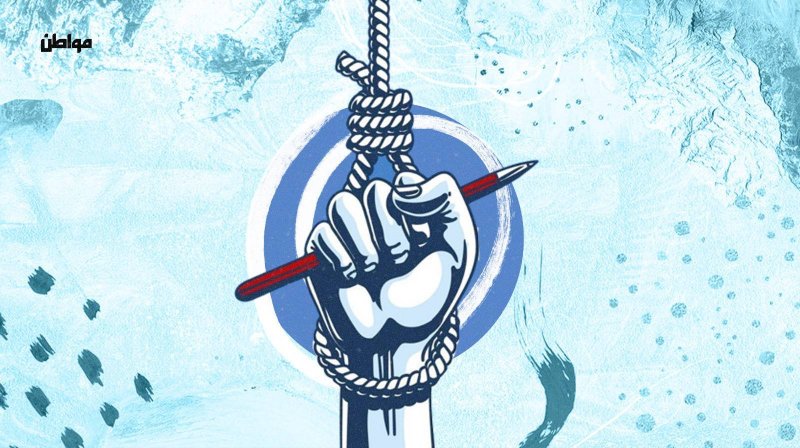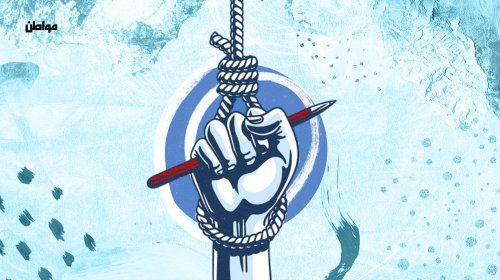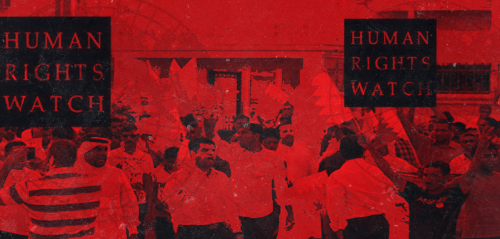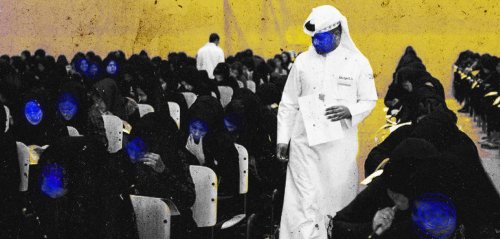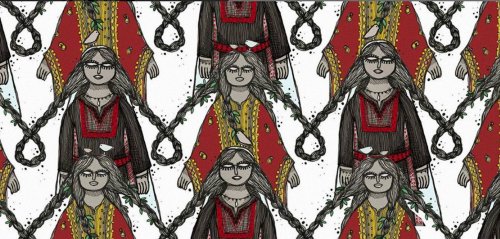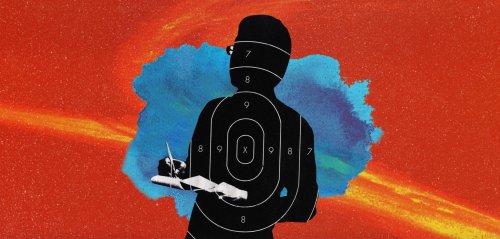This article was published in agreement with "Muwatin".
Being a critical and independent journalist in the Gulf means that you are either under constant surveillance or under constant threat, and you will undoubtedly pay a high price and live in a situation filled with trouble and dangers.
That's how it is: an eternal punishment through being listed on the banned and restricted entry lists among Gulf countries. Your name is distributed across an electronic network shared among the Gulf Cooperation Council (GCC) countries, as part of the security agreement and joint security cooperation.
In November 2010, the security agreement of the GCC was updated and developed in accordance with the decision of the interior ministers of the Gulf countries in their 29th meeting. It consists of legal articles that address security cooperation issues among the council's countries, and it became effective after most of the member states approved it.
These lists were further reinforced after the events of the Arab Spring in 2011 and were circulated more widely in 2012, continuing to harass journalists to this day. Even if a journalist's situation changes and they work in another profession, this issue will continue to haunt them until death and affect his/her choices in life.
The agreement is divided into several sections related to security coordination, border control, cooperation in the field of rescue, and obligations related to the extradition of individuals. The agreement also calls on the GCC countries to extradite individuals within their territories who face accusations or have been convicted by the competent authorities of any of the member states.
An independent journalist or a criminal threatening national security?
If you are a Bahraini journalist and wish to enter Saudi Arabia, the UAE, or Kuwait, you will be detained. Bahrain includes the names of journalists, doctors, businessmen, and others on these lists due to differences in opinion, religious beliefs, or ethnicity.
A Bahraini journalist, who preferred not to mention his name, says, "When I go to Saudi Arabia via the King Fahd Causeway, I am detained at the Saudi customs, and I am asked to park my car on the other side. My passport is taken without any justification, as the employee goes and inquires about me."
"There are security lists that target activists, human rights defenders, journalists, bloggers, and political opponents, restricting their movement in GCC countries in particular, and Arab countries in general" – Human rights activist Sayed Yousef al-Mahafdha
He jokingly adds, "It seems the reason is that I am not a journalist, but a criminal who is threatening national security or opposing the regime... There are many labels and accusations ready."
He continues, "During, I remained sitting in silence, without them providing any answer to my repeated questions about the reason for my detention until the officer deigns to respond – only if he felt like it – saying, 'Oh, turns out you're a journalist. Your name has been registered in the security lists since 2012. You will be detained every time you come to Saudi Arabia by land, air, or sea'."
During his last visit to the Kingdom, the journalist justified his desire to enter Saudi Arabia by performing Hajj this year. The officer replied, "The lists came from Bahrain, and we are simply doing our job. We will implement what is ordered of the officer on duty. We will allow you to pass or return to Bahrain when we receive the decision to do so."
He continues, "Eventually, I was allowed to pass after a long detention, but upon my return, I was detained again, and my passport was handed over to the customs officer on the Saudi side at the King Fahd Causeway."
The detention lasted for about three hours, "and I had the opportunity to witness a considerable number of Bahrainis being arrested in this humiliating and time-wasting manner, men and women, of all ages."
He further states, "I was asked to sign a paper with my colleague stating that we entered Saudi Arabia on a specific date and time, and now we are leaving on this date and time... After that, the officer allowed me to go. And when I arrived at the Bahrain customs, there was no further detention or humiliation waiting for me just because I'm a journalist." Unfortunately, this is the case for journalists traveling from the Gulf, especially Bahrainis.
"There are security lists that target activists, human rights defenders, journalists, bloggers, and political opponents, restricting their movement in the Gulf Cooperation Council countries in particular, and Arab countries in general," as confirmed by Bahraini human rights activist Sayed Yousef al-Mahafdha.
Al-Mahafdha adds, "These lists not only affect press freedom but also impact individuals' basic rights. In the Universal Declaration of Human Rights and the International Covenant on Civil and Political Rights, every person has the right to freedom of movement, and this is also present in the constitutions of all Gulf countries. However, what is happening is a violation of individual's freedom of movement and a violation of citizenship rights," pointing out that "the Pegasus scandal included names from Bahrain in its lists, resulting in work bans and travel bans."
The brightest 'era of freedoms' in Bahrain!
On May 14, 2023, the "Prime Minister's Award for Journalism" was held in its 7th session, with the presence of ministers, senior officials, journalists, and media professionals, celebrating Bahraini Press Day on May 7. The event honors journalists and those working in the field of journalism, and the Prime Minister's Awards for Journalism are presented.
The journalist, who opted to remain anonymous, adds, after the celebration, the headlines shifted to the lack of press freedom in Bahrain, with pictures of officials smiling at the big lie they created. "Official statements in Bahrain reflect the falsification of the media reality in Bahrain and its restriction under security and military authority, and does not depart from the trend of the single media, which accepts only one cosmetic image of a dead journalistic and media scene."
Even though the journalistic scene enjoyed a vibrant atmosphere in Bahrain from 2002, restrictions have increased by the authorities in the mid-2010s, as confirmed by human rights activist Sayed Yousef, "Journalism in Bahrain has become single oriented and monolingual after the closure of Al-Wasat newspaper in June 2017, the only independent and free newspaper in terms of presentation in Bahrain and the Gulf."
The normalization agreements that Bahrain signed with Israel faced widespread popular rejection on social media platforms. However, this opposition did not manifest in any form in the local media throughout 2022.
It has become a matter of media propaganda and voices echoing the achievements of the 'era of freedoms' in Bahrain. Statements confirmed that Bahrain in recent years has reached its brightest era in terms of freedoms!
An example of this model came in a statement by Bahraini Minister of Information, Ramzan Al-Nuaimi, who said, "It embodies the progress and prosperity of Bahraini journalism and press, thanks to the generous support of His Majesty King Hamad bin Isa Al Khalifa, the King of the country, and His Majesty's comprehensive development project that has made journalism in the Kingdom of Bahrain experience its finest and most advanced era of freedoms, providing it with the foundations to carry out its noble mission in serving the nation's causes and achievements with full freedom and openness."
The Bahraini Press Association, formed in London after 2011 in the absence of trade union work for journalists, pointed out in its annual report titled "The Dead Island" that the most prominent indicators observed during 2022 include an increase in complaints filed by the Ministry of Education against its critics. Most of the summons and trials held for citizens on charges of "insulting a law enforcement agency" were tied to the Ministry of Education.
Reporters Without Borders noted in its 2023 annual report that the press "continues to suffer under the oppressive control in the Middle East, whether by authoritarian regimes or due to the censorship imposed on the media"
The normalization agreements that Bahrain signed with Israel faced widespread popular rejection on social media platforms. However, this opposition did not manifest in any form in the local media throughout 2022.
There was, and still is, great hope for a change with the arrival of a new prime minister with extensive powers, but so far, this has not been reflected in the reality of the press, media, or freedoms in general. The wheel is clearly moving backward, with the existence of a directed and non-independent fourth authority.
Today, Bahrain ranks lowest in international indicators related to freedom of opinion, expression, and political freedoms. It ranked last among the six Gulf countries in the annual Press Freedom Index issued by Reporters Without Borders in 2022.
Reporters Without Borders pointed out in its 2023 annual report that the press "is still under suffocating control in the Middle East, whether at the hands of authoritarian regimes or due to censorship imposed on the media. The state of press freedom is considered 'extremely dangerous' in more than half of the countries in the region."
Bahrain ranks 171 out of 180 countries, an extremely low level in the global ranking. Continuous censorship and spying on journalists are used as means to control the press in Bahrain and Gulf countries.
In order to improve this low ranking, Bahrain is required to lift the security restrictions imposed on journalists in the Gulf Cooperation Council countries. Journalists often face entry denials or hours of detention, being treated like criminals, which is a violation of human rights, including the right to freedom of movement.
Bahrain also needs to abandon the monopolization of power over television, radio, and print media to enhance its image, which has been tarnished due to numerous repressive practices. With the continued repression of journalists and the press in recent years, the media landscape in Bahrain has been completely devoid of any coverage of important events and citizens' issues. This has led to the rise of entertainment media as a natural consequence of the absence of a free and independent press. The situation of journalists is not much different from the state of their profession in Bahrain today.
Raseef22 is a not for profit entity. Our focus is on quality journalism. Every contribution to the NasRaseef membership goes directly towards journalism production. We stand independent, not accepting corporate sponsorships, sponsored content or political funding.
Support our mission to keep Raseef22 available to all readers by clicking here!
Interested in writing with us? Check our pitch process here!
